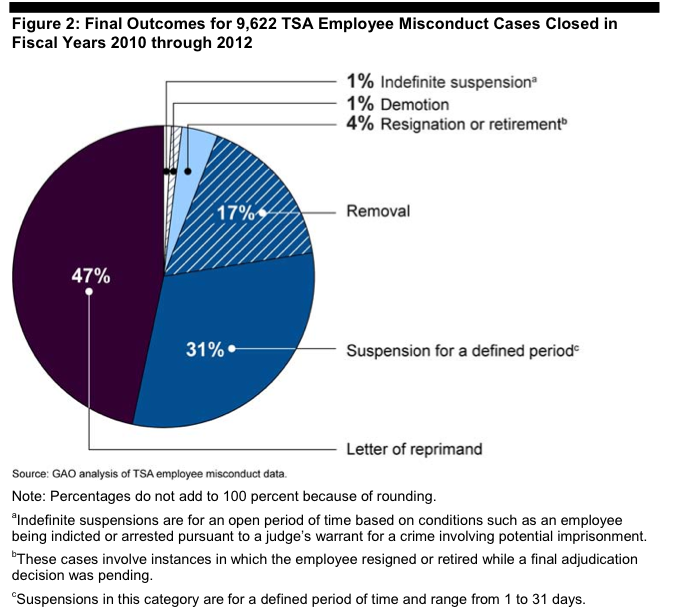TSA Misconduct Cases On The Rise; Agency Not Following Up On All Complaints
According to a new report [PDF] from the federal Government Accountability Office, the TSA investigated a total of 9,622 misconduct cases between 2010 and 2012. In that time, the annual number of cases increased from 2,691 to 3,408. There are approximately 56,000 TSA staffers, so that means that about 1-in-16 employees of the agency was investigated last year.
The purpose of the GAO review was to evaluate the nature of these misconduct investigations, and to look at how the agency manages the investigation and resolution process.
As with many jobs, the largest group of misconduct offenses involved “Attendance and Leave” issues — “Unexcused or excessive absences or tardiness, absence without leave, failure to follow leave procedures.” This accounted for nearly 1/3 of all investigations between 2010 and 2012.
While this might not seem a bit nitpicky to focus on people who overslept or were taking days off they shouldn’t, remember what it’s like to stand in line at airport security while you stare at the lines of screening devices that go unused because there aren’t enough people to work there. In a more general picture, think of all the people that would be happy to have that job but who lost out to the guy who slept through his alarm that morning.
At 20%, the second largest slice of the misconduct pie belonged to “Screening and Security” misconduct — “Failure to follow standard operating procedures, bypassing screening, sleeping on duty.”
This is the one that TSA critics can point to as evidence that the agency has simply gotten lucky that more lethal devices haven’t slipped through.
Overall, 47% of misconduct investigations ended with the dreaded letter of reprimand, showing that the TSA is truly taking homeland security seriously. That said, 31% resulted in a suspension for a definite period of time (only 1% ended in indefinite suspension), while 17% were dismissed from their jobs. Another 4% resigned or retired before a final ruling was handed down.
GAO also identified problems with the way in which TSA conducts its investigations, like how the agency doesn’t check to see that the people conducting the investigations are themselves following the rules. Think of it like the officiating staff who review baseball umpires and NFL referees to make sure they are doing their jobs properly. TSA doesn’t have that.
“TSA does not have a process for conducting reviews of misconduct cases to verify that TSA staff at airports are complying with policies and procedures for adjudicating employee misconduct,” writes the GAO. “Without a review process, it is difficult to determine the extent to which deficiencies, if any, exist in the adjudications process.”
Additionally, TSA is criticized for its failure to keep full documentation of misconduct cases, in spite of having a database in which all that info should be kept. GAO blames TSA leadership, which has not issued guidance requiring the recording of all misconduct investigation outcomes.
“Issuing guidance to TSA staff at airports about recording all case outcomes in the database would emphasize management’s view of the importance of staff including such information to provide a more complete record of adjudication decisions,” explains GAO.
This brings to light the scariest deficiency of the TSA’s investigation and adjudication process — It lacks “procedures to follow up on completed misconduct investigations to ensure that the agency has identified cases requiring adjudication,” writes GAO.
Researchers pulled a random sample of 50 allegations referred from the Department of Homeland Security Office of Inspector General (DHS OIG) to TSA in fiscal year 2012, GAO found that 2 were not adjudicated by TSA.
After this was brought to TSA’s attention, it finally investigated these cases, one of which resulted in a 14-day suspension. That employee would have otherwise gotten away with the misconduct because of holes in the TSA process.
GAO cautions against extrapolating the 4% failure rate found in that 50-case sample to the full list of 1,300 allegations referred to TSA by the Office of the Inspector General in 2012 alone.
That said, GAO admits that these missed cases “raise questions as to whether there could be additional instances of allegations referred to TSA in this population that the agency has not adjudicated.”
Want more consumer news? Visit our parent organization, Consumer Reports, for the latest on scams, recalls, and other consumer issues.


